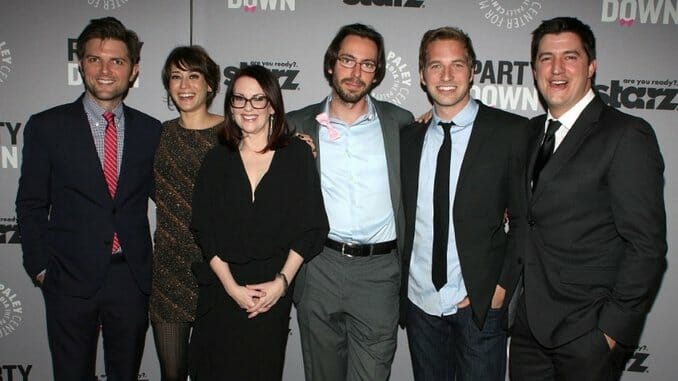The Secret Hope Found in Party Down‘s Cynicism
Photo courtesy of Getty Images Comedy Features Party Down
Over the last 11 months, we’ve all understandably been trying to cope with the overwhelming pressures of the pandemic. For some it’s exercise, for others it’s TV binges, and for others still it’s constantly dispensing inspirational quotes that would be most at home on a kitten poster. We all need our outlets, but this last option often has the opposite of its intended effect. Being told to always “look on the bright side” feels willfully ignorant when it’s so clear that we’re mired in shit. Unwavering optimism is suffocating and unsustainable.
On the other hand, we doubtless need hope to continue on. As the Langston Hughes poem “Dreams” notes, “Hold fast to dreams / For if dreams die / Life is a broken-winged bird / That cannot fly.” The most moving places to find hope, though, aren’t constant peddlers of positivity, but in those that are typically cynical. When a skeptic gives you a reason to dream, it feels far more impactful and realistic. Take, for example, the U.K. Office versus the U.S. Office. When Dawn (Lucy Davis) and Tim (Martin Freeman)—the British versions of Jim and Pam—finally get together in the sitcom, the moment has far more weight because their surroundings are so comparatively bleak. The American Office verges on cartoonish at times (particularly in the later seasons), and when Jim and Pam start dating it feels like far more of an inevitability than a triumph over difficult circumstances.
Enter Party Down, the brainchild of John Enbom, Veronica Mars creator Rob Thomas, Dan Etheridge and Paul Rudd. For a sitcom, the short-lived series (2009 to 2010) manages to sneak in at least a couple heartbreaking moments every episode. Sometimes they’re quiet, like Lydia’s (Megan Mullaly) mention of her mother not wanting to “waste a perfectly good stamp” on her letter to a local children’s television host, or during the pilot when the stifled husband (Enrico Colantoni of Veronica Mars fame) of one party host jumps naked into a pool, ostensibly just to feel alive.
The main characters in Party Down fall loosely into two camps: the cynics and the dreamers. Henry (Adam Scott), Casey (Lizzy Caplan) and Roman (Martin Starr) are part of the former group, while Ron (Ken Marino), Kyle (Ryan Hansen), Constance (Jane Lynch) and Lydia are in the latter. That’s not to say that the cynics don’t strive for something better—Casey’s always auditioning for something—and that the dreamers don’t occasionally feel downtrodden (see: Ron drunk in the back of the Party Down van in the season one finale). However, once you separate the characters this way, it’s evident that skepticism is the currency that Party Down trades in. The dreamer characters are regularly the butt of the joke on the show. They’re deemed pathetic because of just how hard they try to break through in Hollywood, despite their possible lack of talent or the unlikelihood that their plans will work. At the same time, the dreamers also seem to be the overall happiest of the bunch. Sure, they may be the punchline, but they are bolstered by hope.
Henry, as the protagonist, is king of the skeptics. The failed actor’s arc is full of defeatist moments, but indulge me for a moment. We’re constantly reminded of Henry’s acting talent, but when talking to a former acting buddy who’s finally made it big, Henry remarks that “I am done. The towel has been thrown.” In season two, we finally get a peek at his oft-spoken potential when Steve Guttenberg has members of the Party Down catering company act out Roman’s script. Henry throws himself into it, mostly to impress Casey, and blows away the audience. While at the Guttenberg mansion, Casey even finds a DVD of an old indie film Henry was in and sees just how good he is in it. “You know it’s been my experience, nine times out of ten, if you’ve got the talent you break through,” a fully naked Steve Guttenberg says sagely as they all decompress in his hot tub. “Yeah, but what about that one guy?” Henry responds.
Ultimately, though, hope wins out for Henry. In the series finale, after hearing her scene in the Judd Apatow movie was cut, Casey rebuffs Henry’s words of comfort with the biting line, “If you’re not crazy enough to believe it for you, how are you going to believe it for me?” And she’s right; he’s talented but he doesn’t try anymore, so why should she trust him when he says she should keep going? It’s just the wake-up call that Henry needs. The series ends with him being called into the audition room. He may not get the part, but he has hope for himself and, transitively, for Casey.
Cynicism has its place. Being skeptical about the information we receive and the circumstances around us protects us. Cynicism prevents us from falling into QAnon conspiracies and keeps us questioning the powers-that-be. And in Party Down’s Hollywood setting, privilege plays so largely into how life works that only the most naive people wouldn’t find themselves a bit jaded.
However, without hope we’re fucked. There’s no point in even trying. Tempering expectations is well and good, but you have to have at least enough hope to take a shot in the first place. “Now more than ever” is the most overused phrase, but in this moment there’s so much solace to be found in Party Down’s message of enduring hope—even if it’s just a glimmer—amidst crushing despondency.
Clare Martin is a cemetery enthusiast, hibernophile and contributing writer for Paste’s music and comedy sections. She also exercises her love for reality TV at HelloGiggles every now and then. Go harass her on Twitter @theclaremartin.